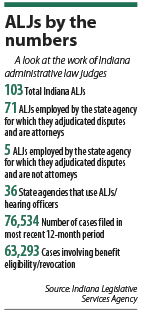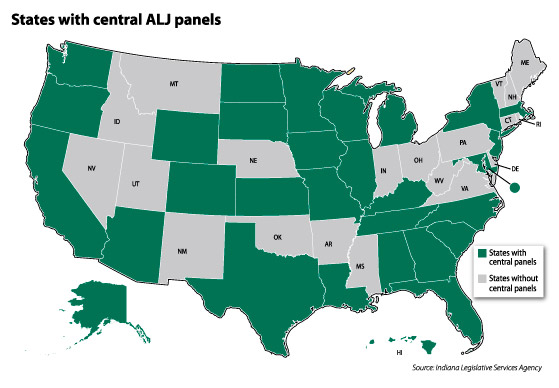Subscriber Benefit
As a subscriber you can listen to articles at work, in the car, or while you work out. Subscribe NowHendricks Superior Judge Bob Freese remembers a case from his practice days where he represented a client before a federal administrative law judge applying the rules of the National Transportation Safety Board. His impression of that experience: “This is a railroading.”
The hearing officer in that case “might as well have been prosecuting the case” for the government, Freese told the General Assembly’s Interim Study Committee on Corrections and Criminal Code, of which he’s a member, at a meeting last month.
Perceived bias of administrative law judges in favor of the state agencies for which they adjudicate disputes has led to calls for Indiana to join 30 other states that have moved to central panels of ALJs to give them more independence. But that won’t happen anytime soon.
The committee on Oct. 13 rendered its final report, punting the issue to the next administration to continue studying creation of a pool of ALJs separated from the agencies for which they adjudicate disputes.
“It’s indefensible if we sit here and think it’s not, on the face of it, a problem that (an ALJ) or hearing officer is an employee or contract employee of the agency,” said Rep. Greg Steuerwald, R-Danville, as the committee finished its business. “It is ridiculous. … I can’t tell you how adamant I am that this is a problem, and if we don’t deal with it, shame on us.”
 Washburne
WashburneCommittee chairman Sen. Tom Washburne, R-Evansville, wrote in a final report that “there does exist at least perceived unfairness” in the system that should be revisited by the next governor. But he also said there was persuasive testimony that ALJs who hear highly technical environmental and utility regulatory agency matters, for instance, should be retained. He also said various agencies heard disputes within timeframes dictated by state and federal law and untangling these poses more challenges than the committee was prepared to undertake.
“This is a big honking project,” he said.
The final report came after representatives of the Indiana Utility Regulatory Commission, Department of Workforce Development and Department of Child Services testified that panels could strain the ability of those agencies to meet deadlines and rule on matters with the sufficient level of subject-matter expertise.
“Technical expertise, we think, could be lost and jeopardized if we moved to an administrative court system,” testified Tim Rushenberg, vice president of the utility trade group Indiana Energy Association.
A survey of agencies that use ALJs produced mixed responses. Of 23 agencies that responded, more than half provided no response or expressed no opinion about whether they favored creation of central panels in Indiana.
 Steuerwald
SteuerwaldBut among agencies that provided an opinion, by a 2-1 margin, respondents agreed with the statement “Independent panels allow ALJs to be free of interference from state agencies for which they work.”
Bose McKinney & Evans LLP partner Nikki Shoultz testified last month that the more than 200 utility lawyers in the Indiana State Bar Association unanimously favor excluding the IURC from proposed ALJ panels. For most, the sentiment is, “If it ain’t broke, don’t fix it.”
The rate-setting agency reviews combine elements of engineering, accounting and finance, she said, and even after years practicing in this area, she’s always learning something new. “For me, it’s close to rocket science,” she said.
Likewise, Bose partner Daniel McInerny said agency reviews of environmental decisions were enacted because trial courts lacked the expertise, particularly in Indiana Department of Environmental Management matters, and environmental lawyers favor keeping the current system. “If this is to be considered, we think the idea of expertise needs to be preserved,” he said. “In the area of environmental law, we like the way it’s working right now.”
But other lawyers said the system is in dire need of reform. Solo practitioner Linda B. Klain said she believed subject matter expertise could be retained if the state switched to ALJ panels.
“There is an appearance of bias, and I would venture to say there is actual bias,” said Klain, who has represented parties in appeals of health agency rulings, and has served as an ALJ. She said ALJs in some agencies feel an expectation of how they should apply the law from the same department heads who evaluate them. She cited this as a reason why she quit serving as a contracted ALJ.
Klain also said creating central panels of ALJs removed from agency oversight would improve efficiency, enhance independence and allow ALJs to share best practices, experience and expertise.
Like Klain, Quarles & Brady LLP partner Randall R. Fearnow represents health care providers before various state agencies. He told the committee that in 25 years of practice, he could count on one hand the number of times his client prevailed before an Indiana ALJ. He said he routinely advises clients to prepare to try their case before the ALJ, lose, and then be prepared retry the case in court. He said this structure means only clients who can afford to finance an appeal of an adverse agency decision do so.
Fearnow called Indiana’s current ALJ structure an “expensive, cumbersome, and ultimately futile system.”
In some cases, he said a Department of Health employee who represented a state agency in one matter later appeared as an administrative law judge in another involving his clients. Such a system produces arbitrary results at best, he said, and “breeds disrespect for the rule of law. … There is no way this process can be made to appear fair.”
The way Indiana agencies use ALJs varies, and some refer to them as hearing officers rather than ALJs. Legislative Services Agency senior fiscal analyst Mark Goodpaster shared study results that show 36 agencies employ some kind of ALJ or hearing officer to adjudicate disputes, but 12 agencies have 10 or fewer such cases a year. Many of these are handled by deputy attorneys general.
Assistant attorney general David Miller said just 81 percent of cases heard by the office’s ALJs resulted in a win for the state, citing this as an example of fairness. Sen. Greg Taylor, D-Indianapolis, wasn’t swayed.
“Anyone who’s successful 81 percent of the time is usually in the hall of fame,” Taylor quipped at a hearing last month.•
Please enable JavaScript to view this content.

